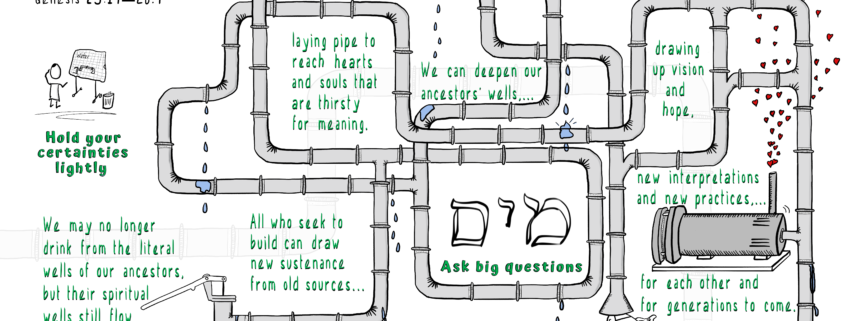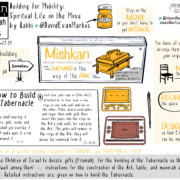Rivka’s Questions, And Our Own: Building Lessons From Toldot

Part of a yearlong series about building and builders inspired by the Torah cycle.
וַיִּתְרֹֽצֲצ֤וּ הַבָּנִים֙ בְּקִרְבָּ֔הּ וַתֹּ֣אמֶר אִם־כֵּ֔ן לָ֥מָּה זֶּ֖ה אָנֹ֑כִי וַתֵּ֖לֶךְ לִדְרֹ֥שׁ אֶת־יְהוָֽ”ה׃
But the children struggled in her womb, and [Rivka] said, “If so, why do I exist?” She went to inquire of God. (Genesis 25:22)
Everyone who dreams and yearns and builds knows the experience of agonizing over a project. Do I really know what I’m doing? What if I had a vision for what this project would be, and now it’s growing into something different? What if I have conflicting visions for what I want to bring into the world, and now I don’t know what to do with that tension?
That’s the experience of our foremother Rivka. Pregnant with twins, she felt them struggling within her. She poured out her heart to God, saying, אִם־כֵּ֔ן לָ֥מָּה זֶּ֖ה אָנֹ֑כִי — If this is what’s going to be, then why am I? (Genesis 25:22)
Here are three lessons for building that I learn from Rivka and from parashat Toldot writ large:
- Be open to surprises.
 Rivka yearned for a child, and Torah tells us that God heard her plea and she conceived. I identify with that on a literal level as a woman who struggled with miscarriage before carrying a pregnancy to term. But I resonate with it even more on a metaphorical level… because once Rivka conceives, things don’t take exactly the shape she anticipated.
Rivka yearned for a child, and Torah tells us that God heard her plea and she conceived. I identify with that on a literal level as a woman who struggled with miscarriage before carrying a pregnancy to term. But I resonate with it even more on a metaphorical level… because once Rivka conceives, things don’t take exactly the shape she anticipated.
This matches my experience of both parenthood and spiritual life. Even if we have what we think are good blueprints, the work may take a different shape than we imagined. The woman who expected one easy infant might get a pair of contentious twins. The committee chair who expected a simple meeting might get a tense interpersonal situation. The builder who expected easy construction might discover that there is critical plumbing running through the wall where he intended to cut the window.
Sometimes the build doesn’t go according to plan. That doesn’t mean that we didn’t plan well or that we shouldn’t be building — rather that life is full of surprises. In Bereshit we were reminded that even God needs a plan B sometimes: clearly this is part of creation’s design. We can’t prepare for every eventuality, but we can learn to “roll with” surprises when they come and to improvise based on what we learn.
- Ask big questions, and hold our certainties lightly.
 When Rivka felt her twins fighting in her womb, she went directly to the big question: if this is what’s happening, why do I exist, why am I even here? We would do well to ask that question in our building work, too. Why are we here? What are we doing? Are we putting our attention and our effort in the right place? Should we be building differently?
When Rivka felt her twins fighting in her womb, she went directly to the big question: if this is what’s happening, why do I exist, why am I even here? We would do well to ask that question in our building work, too. Why are we here? What are we doing? Are we putting our attention and our effort in the right place? Should we be building differently?
In her readiness to ask big questions about her life’s purpose, Rivka also teaches us to hold our certainties lightly. Like Rivka, we too can strive to find a healthy balance between cultivating a vision of what we yearn to create — and being willing to accept that what we’re building might turn out to be a surprise even for us.
Notably, Rivka doesn’t seem to question whether or not God will hear. And sure enough, God answers her right away. Most of us in the modern world don’t have the luxury of feeling heard by (and answered by!) the Source of the Universe. But even “just” asking the questions can be transformative, and can help us suss out the guiding principles that inform our building.
- Old pipes can hold new flow
 This week’s Torah portion is called Toldot, “Generations.” All of us who seek to build the Jewish future do so on the foundations laid by previous generations. It’s on us to honor the foundations they placed, even as we open ourselves like Rivka to surprises — and embrace new interpretations, spiritual technologies, and ideas that our forebears couldn’t have imagined.
This week’s Torah portion is called Toldot, “Generations.” All of us who seek to build the Jewish future do so on the foundations laid by previous generations. It’s on us to honor the foundations they placed, even as we open ourselves like Rivka to surprises — and embrace new interpretations, spiritual technologies, and ideas that our forebears couldn’t have imagined.
Later in Toldot, there’s a verse about re-plumbing an ancestor’s wells (Genesis 26:32). When Torah talks about re-plumbing, it’s not a matter of choosing fixtures for the ensuite bath. Our spiritual ancestors were a desert people for whom water was precious and rare. A well running dry could be a matter of life or death. And, water is also one of Torah’s profoundest metaphors for sustenance, for hope, for life, for God’s presence — even for Torah itself.
We may no longer drink from the literal wells of our ancestors, but their spiritual wells still flow — especially when we delve into them ourselves to ensure that they’re still open. All who seek to build Jewish life can draw new sustenance from old sources, laying pipe to bring reach hearts and souls that are thirsty for meaning. We can deepen our ancestors’ wells, drawing up vision and hope, new interpretations and new practices, for each other and for generations to come.
We may channel that flow to places, and in ways, that our predecessors couldn’t have imagined. In software parlance, I think that’s a feature, not a bug. Someday our descendants (both literal and spiritual) will do the same, building rituals and interpretations and structures that we can’t imagine on the foundations we will have left behind. Our task is to keep the channels open, to ask big questions, and to be open to surprising outcomes.
Just ask Rivka.


by Rabbi Rachel Barenblat; sketchnote by Steve Silbert










Trackbacks & Pingbacks
[…] Rivka’s Questions, And Our Own: Building Lessons from Toldot […]
Comments are closed.